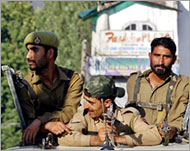Kashmir separatists say fight to go on
The chief of the largest Muslim separatist group fighting security forces in India’s portion of Kashmir warned that “armed struggle” will continue until the disputed Himalayan territory achieves independence.

India cannot “eliminate the movement of jihad (holy war) in Kashmir,” Syed Salahuddin, leader of the Hizb-ul Mujahedeen organization, said on Sunday at a conference on Kashmir, held in Pakistan’s capital, Islamabad.
“We will continue our armed struggle until we get our goal of independence,” Salahuddin said.
Hizb-ul Mujahedeen is the largest of more than a dozen Muslim secessionist groups that have been fighting Indian security forces since 1989 to win Muslim-majority Kashmir’s independence.
Core disagreement
|
“We will continue our armed struggle until we get our goal of independence” Syed Salahuddin, Hizb-ul Mujahedeen |
Kashmir is divided between India and Pakistan, but both countries claim the entire territory. The nuclear-armed neighbours have fought two wars over Kashmir since their independence from British rule in 1947.
India accuses Pakistan of backing the Muslim insurgents, a charge Pakistan denies.
On Sunday, Salahuddin said, “Nobody from outside is helping us. India cannot eliminate the movement of jihad.”
“God help those who fight in the way of God,” he added.
However, Salahuddin also said Hizb-ul Mujahedeen is not opposed to negotiating a settlement.
Expressing skepticism
 |
|
Kashmir insurgency has claimed |
“But the confidence-building measures are an exercise in futility,” Salahuddin said, referring to continuing measures between Pakistan and India that are aimed at settling the Kashmir issue.
“India wants to buy time. It has given India time to break the strength of the mujahedeen (Islamic fighters),” he said.
In January last year, India and Pakistan began a series of meetings aimed at resolving minor disputes before tackling the Kashmir issue, which lies at the core at their decades of enmity.
The thaw has seen the two countries resume severed transportation links, including a bus service across the heavily militarized cease-fire line that divides Kashmir between Pakistan and India.
As part of the bid for peace, the two countries formalized over the weekend an agreement to ward off the risk of accidentally stumbling into war, and formally agreed to give each other advance information on missile tests.
The insurgency in Indian Kashmir has left more than 66,000 people dead, most of them civilians.